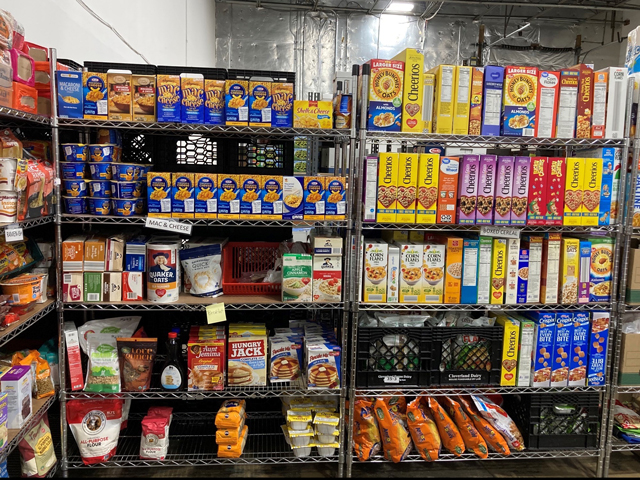Just How Food Pantry Lockhart Provides Vital Resources to Family Members
Just How Food Pantry Lockhart Provides Vital Resources to Family Members
Blog Article
Why Supporting Your Regional Food Pantry Is Important for Helping Those in Requirement
The importance of supporting local food pantries can not be overstated, specifically in the context of food instability, which influences an alarming number of people and families within our communities. These important resources not just offer prompt remedy for appetite but also add to more comprehensive social advantages, consisting of improved wellness and academic results. As we discover the diverse function of food pantries, it ends up being obvious that their influence extends much past just distributing food (Food Pantry Lockhart). Comprehending this much deeper connection may motivate a reconsideration of exactly how we engage with and sustain these important institutions.
Recognizing Food Insecurity
Food instability affects approximately 10.5% of families in the USA, illustrating a significant public health and wellness issue that transcends simple appetite. It describes the lack of consistent accessibility to enough food for an active, healthy life. This condition can bring about a series of adverse end results, including poor wellness, enhanced medical care costs, and lessened academic efficiency among youngsters.
The causes of food insecurity are diverse, often originating from economic aspects such as unemployment, underemployment, and hardship. Geographic area can also play a crucial function, with food deserts-- locations with restricted access to cost effective and nutritious food-- aggravating the problem - Food Pantry Lockhart. Additionally, systemic aspects, including racial and social injustices, add to the out of proportion influence of food instability on marginalized communities
Dealing with food instability is not merely about boosting food supply; it requires a detailed technique that encompasses financial security, education, and neighborhood support. Food insecurity not only affects specific well-being however likewise has broader implications for societal health and wellness and efficiency. Understanding its intricacy is vital for developing efficient treatments and promoting long-term services that make certain all people have reputable accessibility to nourishing food.
The Duty of Food Pantries
Neighborhood food kitchens function as crucial lifelines for people and households encountering food instability. They provide crucial food things to those that might have a hard time to pay for adequate nourishment due to economic difficulty, joblessness, or unanticipated conditions. By dispersing food at no cost, these companies aid relieve appetite and protect against the adverse wellness influences related to poor diet regimens.
Food cupboards usually partner with regional ranches, supermarket, and area companies to resource a variety of nourishing food things, consisting of fresh produce, dairy, and healthy proteins. This cooperation guarantees that cupboard customers obtain not just food yet likewise healthier choices that add to total health.
Additionally, food kitchens work as community hubs, fostering links among residents and supplying a feeling of self-respect to those in requirement. Many cupboards use added resources, such as nutrition education and recommendations to social solutions, helping customers navigate their difficulties better.
In significance, food kitchens play a multifaceted duty in combating food instability. They not only address prompt appetite but additionally encourage family members and people to boost their circumstances, consequently promoting neighborhood resilience and cohesion.

Benefits of Supporting Food Pantries

Supporting food kitchens not just nourishes those in demand yet additionally strengthens the textile of the neighborhood. By supplying necessary food resources, food pantries ease hunger and reduce food insecurity, which is important for the health and wellness and health of households and people. Accessibility to nourishing food contributes to improved physical wellness, far better academic results for children, and improved psychological health, consequently fostering an extra productive and involved area.
Furthermore, supporting food cupboards advertises social communication. These companies function as centers for neighborhood engagement, uniting volunteers, donors, and recipients in a common mission to battle cravings. This cooperation can break down obstacles, foster understanding, and build partnerships among diverse neighborhood participants.
Additionally, contributions to food cupboards, whether in the type of food, funds, or time, boost the regional economy. Lots of food pantries focus on sourcing from regional manufacturers, thus supporting neighborhood farming and companies. This produces a cycle of support that benefits not only those in requirement yet the community as a whole.
How to Get Included
Engagement with food pantries can take many types, permitting teams and people to make a meaningful impact in their communities. Monetary donations are likewise vital, as they make it possible for food kitchens to acquire fresh produce and necessary supplies.
Offering your time is another impactful method to support local food kitchens (Food Pantry Lockhart). In enhancement, consider arranging food drives within your work environment, institution, or neighborhood team to increase understanding and gather resources.
Collaborations with regional companies can additionally boost assistance for food pantries. By taking these teams, actions and individuals can significantly boost the initiatives of regional food kitchens and aid those in need.
Neighborhood Effect and Link
Acknowledging the profound influence of food cupboards on area well-being is necessary for fostering a spirit of link and cooperation. Food kitchens serve not just as crucial resources for those dealing with food instability yet likewise as centers for area interaction. They bring with each other varied groups-- volunteers, benefactors, and clients-- creating an atmosphere where individuals can sustain and link each other.
The influence of food kitchens prolongs past plain arrangement of food; they function as a driver for social cohesion. By taking part in cupboard initiatives, neighborhood members can establish connections that transcend socioeconomic obstacles. This network of support aids to take down the stigma frequently connected with food support, promoting an environment of approval and understanding.
Additionally, food kitchens usually team up with local organizations, colleges, and organizations, magnifying their reach and performance. These collaborations improve my site community strength and encourage a cumulative response to food insecurity. As individuals unify in their initiatives to sustain neighborhood food kitchens, they grow a feeling of shared objective and responsibility, strengthening the concept that everyone has a duty to play in making sure that no one goes starving. Ultimately, supporting food pantries enhances the fabric of the area as a whole.
Final Thought
Supporting regional food cupboards is essential in combating food instability and boosting the wellness of prone populations. Interaction with food kitchens cultivates area links, advertising social cohesion and equity.

Report this page